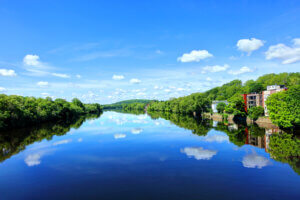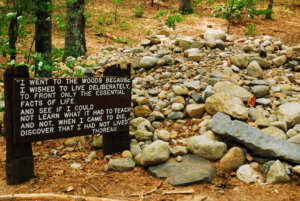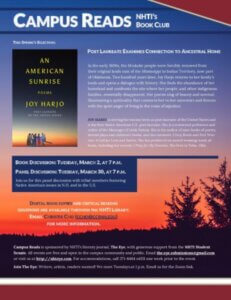By Paula DelBonis-Platt, Ph.D., Professor of English and French and Chair of the Liberal Arts Department

An English teacher friend of mine taught an entire course that focused on the Broadway musical Hamilton, analyzing casting choices by Lin-Manuel Miranda and digging into writings by Alexander Hamilton himself. Talk about getting students interested in literature and history! I’m not sure if they leaped onto tables and broke into song, but I like to imagine it that way. I also enjoy getting students thinking, researching, talking – and occasionally singing – in courses that survey a wider swath of our American landscape.
In educational terms, we call this project-based learning. One college administrator who advocates such learning says, “It’s fun for everyone. It’s harder, but it makes life more interesting” – and she’s right. It requires extra planning but pays dividends in student engagement.
My American Literature students can read Henry David Thoreau’s Walden and A Week on the Concord and Merrimack Rivers, but with the Merrimack River lapping our campus and the path from “old Concord” in Mass. to “new Concord” in N.H., drawn in those sparkling cascades, it would be a shame to stop there. A trip to Walden Pond is fun, but to encourage deeper thinking I once asked my students to investigate what historical markers exist for such writers as those we were studying – those who lived in our backyard, so to speak – to look at the demographics of those recognized by historical markers, and ultimately, to propose some new ones to our community.
 The students in that class took right to it. Zack wanted to place a marker near the site where Thoreau and his brother John camped not far from the Concord Boys’ and Girls Club. Fellow student Ryan thought it might go near the Hooksett Pinnacle, where the Thoreau brothers landed their boat. Samuel proposed a public marker in Milford for African American writer Harriet E. Wilson. Elisa and Jeff thought that poet laureate Donald Hall of Wilmot, who’d recently died, deserved such an honor. And Heather and Miranda reached out to historical societies on the Seacoast to research the Treaty of Portsmouth, calling it a “ginormous triumph for our state, let alone our country” with delegates from Japan and Russia gathering with Pres. Theodore Roosevelt. And Zack did manage to splash the water from Walden Pond on his face during a field trip that semester and shared his research with N.H. legislator Dave Luneau, after reading literature to support this exciting learning.
The students in that class took right to it. Zack wanted to place a marker near the site where Thoreau and his brother John camped not far from the Concord Boys’ and Girls Club. Fellow student Ryan thought it might go near the Hooksett Pinnacle, where the Thoreau brothers landed their boat. Samuel proposed a public marker in Milford for African American writer Harriet E. Wilson. Elisa and Jeff thought that poet laureate Donald Hall of Wilmot, who’d recently died, deserved such an honor. And Heather and Miranda reached out to historical societies on the Seacoast to research the Treaty of Portsmouth, calling it a “ginormous triumph for our state, let alone our country” with delegates from Japan and Russia gathering with Pres. Theodore Roosevelt. And Zack did manage to splash the water from Walden Pond on his face during a field trip that semester and shared his research with N.H. legislator Dave Luneau, after reading literature to support this exciting learning.
When opportunities such as these present themselves, I try not to shy away. I regularly teach Images of Women in Literature, and my Spring 2020 semester coincided with the 100th anniversary of the 19th amendment, giving most (but not all) American women the vote. The time felt right to allow students to explore images of empowerment in our literature and beyond; to help them build a website of their research and writing, complete with photos and infographics they made; and to see where their inspiration would lead. Little did we know, it would also coincide with a pandemic that sent us remote after spring break. Building a website then seemed like both a blessing and curse. But when you set the bar high, students rise to the occasion. They worked collaboratively in groups, easily continued conversations in Zoom, published their website in collaboration with the NHTI student journal, and earned first prize in the “Change the World” category for the New Hampshire Humanities Collaborative’s HUGEmanities contest. They didn’t give up when both life and their projects got, well, interesting! That’s a skill that will take these students far.
The opportunities for collaborative project-based learning are almost endless. They can be linked to service learning, such as NHTI’s French students preparing poutine and trivia for NHTI’s annual Multicultural Fair and reflecting on the experience. They can be tied to experiential learning, hosting or attending an author event, or visiting a historical site. And they are evident in the projects that provide resume-worthy skills and projects for students to share with prospective employers.

This spring’s adventure will take us into the rich stories of indigenous Americans. I was inspired by reading An American Sunrise by Joy Harjo, the U.S.’s first Native American poet laureate, and by the historical marker to the Penacook, a branch of the Abenaki. These are a vibrant people who have lived in this region for 12,000 years, including along the gentle bends of the Merrimack River, that sparkling jewel that ties our campus to the larger world. I’m excited to see where this next project-based learning adventure takes us.
>>Join our Campus Reads book club in Spring 2021 as we discuss An American Sunrise by Joy Harjo!
Read More:

